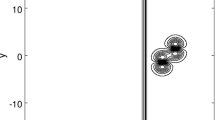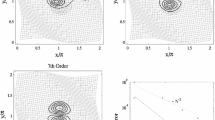Abstract
The objective of this work is to improve nonlinear stability and to minimize aliasing error by applying high order central discretizations to skew-symmetric splitting forms of the inviscid flux derivative without added high order numerical dissipation for both shock-free compressible turbulence and turbulence with weak shocks. Skew-symmetric splittings of the inviscid flux derivative for high order central schemes are studied and developed for gas dynamics and MHD systems. For problems containing discontinuities and multiscale turbulence fluctuations the Yee and Sjögreen (Proceedings of the ICOSAHOM09, Trondheim, 2016) high order nonlinear filter approach is utilized at isolated computational regions, while maintaining high accuracy almost everywhere for direct numerical simulation and large eddy simulations of turbulence computations. Three skew-symmetric splittings are considered for a wide range of compressible flow speeds and flow types, including a 3D forced turbulence simulation. Not all of the skew-symmetric splittings used for gas dynamics can be extended to the non-strictly hyperbolic conservation laws of ideal magnetohydrodynamics (MHD) governing equations. In this work, the Ducros et al. (J Comput Phys 161:114–139, 2000) splitting variants are constructed for MHD. Four formulations of the MHD equations are considered. The different formulations of the equations in conjunction with the variants of Ducros et al. type skew-symmetric splitting will be shown to have a strong effect on the stability of non-dissipative approximations.





































Similar content being viewed by others
References
Arakawa, A.: Computational design for long-term numerical integration of the equations of fluid motion: two-dimensional incompressible flow, Part I. J. Comput. Phys. 1, 119–143 (1966)
Bauer, A., Schaal, K., Springel, V., Chandrashekar, P., Pakmore, R., Klingenberg, C.: Simulating turbulence using the astrophysical discontinuous Galerkin code TENET. In: Lecture Notes in Computational Science and Engineering (Feb. 2016)
Blaisdell, G.A., Spyropoulos, E.T., Qin, J.H.: The effect of the formulation of nonlinear terms on aliasing errors in spectral methods. Appl. Numer. Math. 21, 207–219 (1996)
Brackbill, J.U., Barnes, D.C.: The effect of nonzero \(\nabla \cdot { B}\) on the numerical solution of the magnetohydrodynamics equations. J. Comput. Phys. 35, 426–430 (1980)
Brachet, M., Meiron, D., Orszag, S., Nickel, B., Morf, R., Frisch, U.: Small-scale structure of the Taylor–Green vortex. J. Fluid Mech. 130, 411 (1983)
Chandrashekar, P., Klingenberg, C.: Entropy stable finite volume scheme for ideal compressible MHD on 2-D Cartesian Meshes. SIAM J. Numer. Anal. 54, 1313–1340 (2016)
Coppola, G., Capuano, F., Pirozzoli, S., de Luca, L.: Numerically stable formulations of convective terms for turbulent compressible flows. Fluid Dyn. Comput. Phys. (2019). https://doi.org/10.1016/j.jcp.2019.01.007
Derigs, D., Winters, A.R., Gassner, G., Walch, S.: A novel high-order, entropy stable, 3D AMR MHD solver with guaranteed positive pressure. J. Comput. Phys. (2016). https://doi.org/10.1016/j.jcp.2016.04.048
Ducros, F., Laporte, F., Soulères, T., Guinot, V., Moinat, P., Caruelle, B.: High-order fluxes for conservative skew-symmetric-like schemes in structured meshes: application to compressible flows. J. Comput. Phys. 161, 114–139 (2000)
Ducros, F., Ferrand, V., Nicoud, F., Weber, C., Darracq, D., Gacherieu, C., Poinsot, T.: Large-eddy simulation of the shock/turbulence interaction. J. Comput. Phys. 152, 517–549 (1999)
Gerritsen, M., Olsson, P.: Designing an efficient solution strategy for fluid flows. I. A stable high order finite difference scheme and sharp shock resolution for the Euler equations. J. Comput. Phys. 129, 245 (1996)
Godunov, S.K.: The symmetric form of magnetohydrodynamics equation. Numer. Meth. Mech. Cont. Med. 1, 26–34 (1972)
Harten, A.: On the symmetric form of systems for conservation laws with entropy. J. Comput. Phys. 49, 151 (1983)
Honein A.E., Moin, P.: Numerical aspects of compressible turbulence simulations. Report No. TF-92, Department of Mechanical Engineering, Stanford University (2005)
Janhunen, P.: A Positive conservative method for MHD based on HLL and Roe methods. J. Comput. Phys. 160, 649–661 (2000)
Johansson, S.: High order summation by parts operator based on a DRP scheme applied to 2D. Technical Report 2004-050. Uppsala University, Sweden
Jiang, C.-S., Shu, C.-W.: Efficient implementation of weighted ENO schemes. J. Comput. Phys. 128, 202 (1996)
Kennedy, C.A., Gruber, A.: Reduced aliasing formulations of the convective terms within the Navier–Stokes equations. J. Comput. Phys. 227, 1676–1700 (2008)
Kotov, D.V., Yee, H.C., Wray, A.A., Sjögreen, B., Kritsuk, A.G.: Numerical dissipation control in high order shock-capturing schemes for LES of low speed flows. J. Comput. Phys. 307, 189–202 (2016)
Kotov, D.V., Yee, H.C., Wray, A.A., Sjögreen, B.: High order numerical methods for dynamic SGS model of turbulent flows with shocks. Commun. Comput. Phys. 19, 273–300 (2016)
Kreiss, H.O.: Numerical methods for solving time-dependent problems for partial differential equations. Les Presses de l’Université de Montreéal (1978)
Larsson, J., Lele, S.K.: Direct numerical simulation of canonical shock/turbulence interaction. Phys. Fluids 21, 126101 (2009)
Olsson, P., Oliger, J.: Energy and maximum norm estimates for nonlinear conservation laws. RIACS Technical Report 94.01 (1994)
Pirozzoli, S.: Generalized conservative approximations of split convective derivative operators. J. Comput. Phys. 219, 7180–90 (2010)
Ristorcelli, J.R., Blaisdell, G.A.: Consistent initial conditions for the DNS of compressible turbulence. Phys. Fluids 9(4), 4–6 (1997)
Sandham, N.D., Li, Q., Yee, H.C.: Entropy splitting for high-order numerical simulation of compressible turbulence. J. Comput. Phys. 23, 307–322 (2002)
Shu, C.-W., Osher, S.J.: Efficient implementation of essentially non-oscillatory shock capturing schemes. J. Comput. Phys. 83, 32–78 (1989)
Sjögreen, B., Yee, H.C.: Multiresolution wavelet based adaptive numerical dissipation control for high order methods. J. Sci. Comput. 20, 211–255 (2004)
Sjögreen, B., Yee, H.C.: On skew-symmetric splitting and entropy conservation schemes for the Euler equations. In: Proceedings of ENUMATH09, June 29–July 2. Uppsala University, Sweden (2009)
Sjögreen, B., Yee, H.C.: On high order entropy conserving numerical flux for multiscale gas dynamics and MHD turbulent simulations. In: Proceeding of ICOSAHOM-2016, June 27–July 1, Rio de Janeiro, Brazil (2016)
Sjögreen, B., Yee, H.C.: High order entropy conserving central schemes for wide ranges of compressible gas dynamics and MHD flows. J. Comput. Phys. 364, 153–185 (2018)
Sjögreen, B., Yee, H.C.: Accuracy consideration by DRP schemes for DNS and LES of compressible flow computations. Comput. Fluids 159, 123–136 (2017)
Sjögreen, B., Yee, H.C.: An entropy stable method revisited: central differencing via entropy splitting and SBP. In: Proceeding of ICOSAHOM-2018, July 9–13. Imperial College, London (2018)
Strand, B.: Summation by parts for finite difference approximations for d/dx. J. Comput. Phys. 110, 47–67 (1994)
Tadmor, E.: Numerical viscosity and the entropy condition for conservative difference schemes. Math. Comput. 43, 369–381 (1984)
Taylor, G., Green, A.: Mechanism of the production of small eddies from large ones. Proc. R. Soc. Lond. A 158, 499 (1937)
Winters, A.R., Gassner, G.J.: Affordable, entropy conserving and entropy stable flux functions for the ideal MHD equations. J. Comput. Phys. 304, 72–108 (2016)
Yee, H.C., Sandham, N.D., Djomehri, M.J.: Low-dissipative high order shock-capturing methods using characteristtic-based filters. J. Comput. Phys. 150, 199–238 (1999)
Yee, H.C., Vinokur, M., Djomehri, M.J.: Entropy splitting and numerical dissipation. J. Comput. Phys. 162, 33–81 (2000)
Yee, H.C., Sjögreen, B.: Efficient low dissipative high order schemes for multiscale MHD flows, II: minimization of \(\nabla \cdot B\) numerical error. J. Sci. Comput. 29, 115–164 (2006)
Yee, H.C., Sjögreen, B.: Development of low dissipative high order filter schemes for multiscale Navier–Stokes MHD systems. J. Comput. Phys. 225, 910–934 (2007)
Yee, H.C., Sjögreen, B.: High order filter methods for wide range of compressible flow speeds. In: Proceedings of the ICOSAHOM09, June 22–26, Trondheim, Norway (2016)
Yee, H.C., Sjögreen, B.: Recent developments in accuracy and stability improvement of nonlinear filter methods for DNS and LES of compressible flows. Comput. Fluids 169, 1–18 (2017)
Acknowledgements
The support of the DOE/SciDAC SAP Grant DE-AI02-06ER25796 is acknowledged. The work was performed with the third author as a research scientist at the Bay Area Environmental Research Institute. Financial support from the NASA TTT/RCA program for the second author is gratefully acknowledged. The authors are grateful to Dr. Andreas Bauer for providing his assistance for their forced turbulence test case study and problem set up routines, and to Dr. Alan Wray of NASA Ames Research Center for the numerous invaluable discussions throughout the course of this work.
Author information
Authors and Affiliations
Corresponding author
Additional information
Publisher's Note
Springer Nature remains neutral with regard to jurisdictional claims in published maps and institutional affiliations.
An expanded version of the Proceedings of ASTRONUM-2016, June 6–10, 2016, Monterey, CA, USA.
Rights and permissions
About this article
Cite this article
Sjögreen, B., Yee, H.C., Kotov, D. et al. Skew-Symmetric Splitting for Multiscale Gas Dynamics and MHD Turbulence Flows. J Sci Comput 83, 43 (2020). https://doi.org/10.1007/s10915-020-01225-w
Received:
Revised:
Accepted:
Published:
DOI: https://doi.org/10.1007/s10915-020-01225-w




